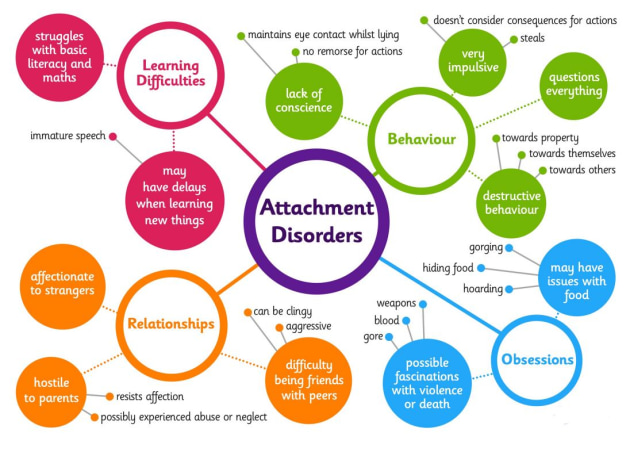Attachment disorder; or, reactive attachment disorder (RAD), is a condition where a child is unable to form stable relationships with people they do not know. This disorder affects as many as one in every eight babies. No. 85; December 2020.
RAD Children with reactive attachment disorder are less likely than children without reactive attachment disorder to engage in interpersonal relationships due to negative experiences with strangers in their early years. The disorder often begins in early childhood and continues into adolescence. Symptoms usually persist for six months to three years and become more severe over time. Some children may not have symptoms.
The most common symptoms of reactive attachment disorder are an inability to feel comfortable in close proximity to others, crying frequently, clinging to, refusing to let go, and avoiding eye contact and talking. They often refuse to cooperate with others, which can cause conflict, anxiety, and embarrassment in the parent. A child with reactive attachment disorder can act against authority figures. They can exhibit extreme tantrums that usually do not go away. Many children with reactive attachment disorder will manipulate others, and sometimes those they care about, from time to time.
A child with this disorder has difficulty forming secure attachments that help him or her deal with anger, stress, and fear. In the early years of life, children with reactive attachment disorder may exhibit strange behaviors such as fidgeting, biting, and hitting. Some children may not speak at all or appear indifferent and uncaring.
All types of attachment disorders affect children in different ways. The symptoms and impact of each disorder can vary depending on the severity of the disorder and the age of the child at the onset. The disease can last a lifetime, affect all aspects of development, and lead to lifelong hardships for the child. In addition, many children with these disorders have physical and mental health problems.
Attachment disorders occur when a child has difficulty making and maintaining healthy, safe relationships, including attachment with caregivers. A child with these disorders may not be able to establish a permanent relationship with a parent or other caregiver. They often have difficulty establishing strong attachment relationships with others outside of their family or with people who they feel do not have the same needs.

Because of the complexity of this disorder, it is important to understand that no one type of treatment is perfect, especially since every child is different
There are several treatment options available to help a child with this disorder develop an enduring relationship with others. Children can benefit from counseling, therapeutic parenting, psychotherapy, and specialized classes in parenting and attachment theory. If the child's symptoms do not improve after a thorough evaluation by a trained mental health provider, they may need to undergo a long-term psychological evaluation to determine the cause. Treatment may involve psychosocial interventions and medications to help improve the child's ability to connect with others and learn appropriate ways of responding to stress and fear.
If a parent suspects that your child may have attachment disorder, it is crucial to seek medical care right away to ensure that treatment is appropriate for your child's health and safety. A doctor can help you evaluate your child's developmental needs and to help you determine the best course of action. Your child's health care provider is your key ally in the treatment process.
There are some medications that can help improve your child's health and life. These medications can help calm your child, soothe their stress and anxiety, and reduce the frequency of episodes of tantrums. These medications include clonidine (Clomipramine), fluoxetine (Prozac), and lithium. In addition, psychotherapy can be helpful, especially if your child is dealing with anger and fear issues.
In order for attachment disorder to be treated successfully, your doctor should have a complete history of the child's medical histories, including allergies to the medications, if applicable, and symptoms of the disorder. The child should be evaluated thoroughly to determine any underlying health concerns or conditions that may be causing the symptoms. The child should also be examined for irritability and emotional volatility. An assessment should be done to determine the most effective treatment plan for your child's specific needs.
Once your child has been diagnosed with attachment disorder, there are many treatment options available for them. Most physicians will recommend that your child take medications, therapy, psychotherapy, and special classes in attachment parenting.